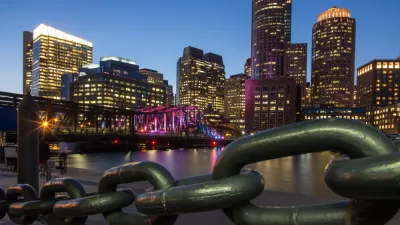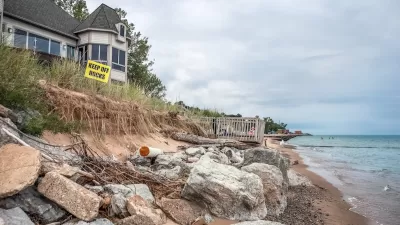Several agencies with the city of Boston will begin studying how to retrofit the city's building codes to prepare for the impacts of climate change.
Jon Chesto reports that Boston Mayor Martin J. Walsh "has directed the Boston Redevelopment Authority and the city’s environmental services and inspectional services divisions to reduce the red tape involved with building or modifying a structure if it’s for the purpose of making it less prone to flood damage."
The order from the mayor is intended to help developers prepare for the impacts of rising seas as a result of climate change. The improvements at the ground level could have an impact at higher elevations of the city 's building stock, however. According to Chesto, "the three city agencies will determine whether it’s OK to raise height restrictions to accommodate putting mechanical systems on a higher floor, or on the roof. To avoid flood damage, electrical and HVAC systems would be located above the ground floor. But that could take away from valuable office or residential space. An extra height allowance could give owners and developers room to make up the difference."
It's possible that zoning codes that come out of a new policy could change the way buildings are measured. "In other words, a certain amount of 'flood resistant' footage wouldn’t be counted against a building’s height limit," writes Chesto.
As for existing buildings, one business owner cited by Chesto has already requested permission from the Boston Redevelopment Authority to build extra office space on the roof of a building in exchange for moving electrical systems out of the basement.
FULL STORY: Boston aims to help developers plan for rising seas

Americans May Be Stuck — But Why?
Americans are moving a lot less than they once did, and that is a problem. While Yoni Applebaum, in his highly-publicized article Stuck, gets the reasons badly wrong, it's still important to ask: why are we moving so much less than before?

Using Old Oil and Gas Wells for Green Energy Storage
Penn State researchers have found that repurposing abandoned oil and gas wells for geothermal-assisted compressed-air energy storage can boost efficiency, reduce environmental risks, and support clean energy and job transitions.

Placekeeping: Setting a New Precedent for City Planners
How a preservation-based approach to redevelopment and urban design can prevent displacement and honor legacy communities.

San Francisco’s Muni Ridership Grew in 2024
The system saw its highest ridership since before the Covid-19 pandemic, but faces a severe budget shortage in the coming year.

Colorado Lawmakers Move to Protect BRT Funding
In the face of potential federal funding cuts, CDOT leaders reasserted their commitment to planned bus rapid transit projects.

Safe Streets Funding in Jeopardy
The Trump administration is specifically targeting bike infrastructure and other road safety projects in its funding cuts.
Urban Design for Planners 1: Software Tools
This six-course series explores essential urban design concepts using open source software and equips planners with the tools they need to participate fully in the urban design process.
Planning for Universal Design
Learn the tools for implementing Universal Design in planning regulations.
Heyer Gruel & Associates PA
City of Moreno Valley
Institute for Housing and Urban Development Studies (IHS)
City of Grandview
Harvard GSD Executive Education
Salt Lake City
NYU Wagner Graduate School of Public Service
City of Cambridge, Maryland





























